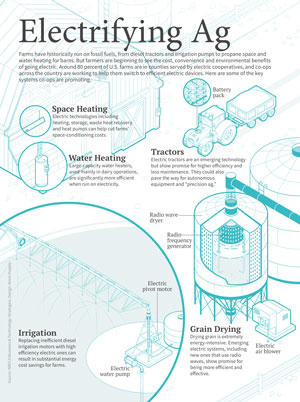A Bright Future for Co-ops and Agriculture
Co-ops and farms have a history of working together, utilizing new technologies
By Donnie SpiveyElectric cooperatives across North Carolina have a long and fruitful history of support and cooperation with our agricultural communities. In fact, electric co-ops in the state were formed by farmers and rural communities banding together, working toward the common goal of improving their quality of life by electrifying homes and businesses throughout the countryside. I am proud to say their extraordinary efforts were tremendously successful!
Today, that history of support and cooperation continues. North Carolina’s electric cooperatives work closely with our agricultural communities in a number of different ways.
A never-ending focus is placed on farming safety, especially as it relates to electric hazards on and around the farm. Remaining aware of overhead lines when operating large machinery and locating underground lines before digging operations are critical safety practices.
Co-ops and farms have a history of working together, utilizing new technologies.
Another important mission for electric cooperatives is working with agricultural businesses to assist with their strategies to reduce operating costs.
In recent years, electric co-ops and farms have worked together to transition from incandescent lightbulbs to LED light bulbs in poultry and swine houses, resulting in a significant reduction in the farm power costs by using electricity more efficiently.
There are other opportunities to reduce energy use through strategies around the concept of beneficial electrification — the transition to using electric power in place of fossil fuels. Beneficial electrification provides farms with a wide range of advantages, from improved energy efficiency and reduced carbon emissions to cost savings and increased productivity.
A perfect example of this is a partnership between my home cooperative, Pee Dee Electric, North Carolina’s Electric Cooperatives, and a local farming operation. The three entities worked together to secure a significant grant from the Beneficial Electrification League for White Rock Farms to replace a large diesel pump with an innovative single-phase electric motor and pump. This project resulted in an improvement in energy efficiency, reduced carbon emissions, lower operating costs, and improved labor productivity on the farm.
Other electric cooperatives in the state are working with agricultural businesses to help them meet sustainability goals and improve grid resiliency. For example, South River EMC has partnered with Butler Farms to successfully develop a microgrid designed to improve system reliability and resiliency by seamlessly incorporating renewable energy (biogas and solar), battery storage and emergency backup power into the grid.
North Carolina’s electric cooperatives and our agricultural community have a long and rewarding history of working together utilizing innovation and new technologies. Through this cooperative spirit, I am confident our future is even brighter.
About the Author
Donnie Spivey is CEO and executive vice president for Lilesville-based Pee Dee Electric.-
More Viewpoints
-
Share this story:








